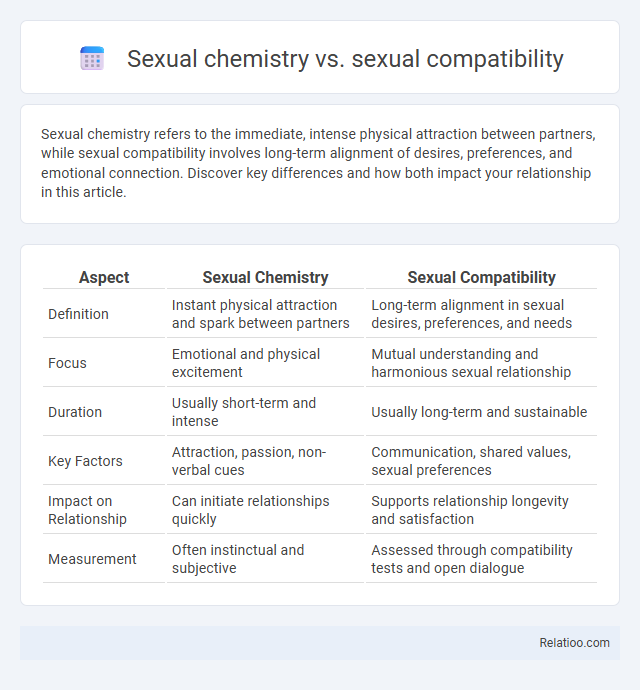Sexual chemistry refers to the immediate, intense physical attraction between partners, while sexual compatibility involves long-term alignment of desires, preferences, and emotional connection. Discover key differences and how both impact your relationship in this article.
Table of Comparison
| Aspect | Sexual Chemistry | Sexual Compatibility |
|---|---|---|
| Definition | Instant physical attraction and spark between partners | Long-term alignment in sexual desires, preferences, and needs |
| Focus | Emotional and physical excitement | Mutual understanding and harmonious sexual relationship |
| Duration | Usually short-term and intense | Usually long-term and sustainable |
| Key Factors | Attraction, passion, non-verbal cues | Communication, shared values, sexual preferences |
| Impact on Relationship | Can initiate relationships quickly | Supports relationship longevity and satisfaction |
| Measurement | Often instinctual and subjective | Assessed through compatibility tests and open dialogue |
Understanding Sexual Chemistry
Sexual chemistry refers to the intense, immediate physical and emotional attraction between partners, often driven by biological and hormonal factors. Sexual compatibility, on the other hand, involves aligning preferences, desires, and boundaries to sustain a fulfilling sexual relationship over time. Understanding sexual chemistry is crucial for recognizing initial attraction, while compatibility tests help evaluate long-term harmony in intimacy and relationship dynamics.
Defining Sexual Compatibility
Sexual compatibility refers to the harmonious alignment of sexual desires, preferences, and boundaries between partners, fostering mutual satisfaction and intimacy. Unlike sexual chemistry, which is often immediate and based on physical attraction and emotional excitement, sexual compatibility emphasizes long-term alignment and communication about sexual needs. Compatibility tests help identify these aspects by evaluating partners' sexual values, preferences, and expectations to enhance relationship quality and reduce potential conflicts.
Key Differences Between Sexual Chemistry and Compatibility
Sexual chemistry refers to the immediate physical attraction and intense emotional connection between two people, often driven by passion and desire. Sexual compatibility involves how well partners' sexual preferences, needs, and pace align, promoting long-term satisfaction and harmony in intimacy. Your understanding of these key differences can be enhanced using a compatibility test, which evaluates deeper aspects like values, communication, and lifestyle beyond mere physical attraction.
The Role of Attraction in Sexual Chemistry
Sexual chemistry plays a crucial role in sparking initial attraction, driven by physical and emotional signals that create an intense connection between partners. Sexual compatibility, however, goes beyond this immediate spark, encompassing shared preferences, desires, and communication styles that sustain a fulfilling intimate relationship. Your understanding of these dynamics can be deepened through a compatibility test, which evaluates how well you and your partner align on key factors influencing long-term satisfaction.
Communication and Sexual Compatibility
Sexual chemistry refers to the immediate physical attraction and emotional excitement between partners, while sexual compatibility involves a deeper alignment in sexual desires, preferences, and communication styles that sustain long-term intimacy. Effective communication is crucial in sexual compatibility, allowing partners to express needs, set boundaries, and resolve conflicts, which enhances mutual satisfaction and emotional connection. Compatibility tests often assess communication skills and sexual preferences to provide insights into relationship strengths and areas needing improvement for a harmonious sexual partnership.
Emotional Connection: Impact on Chemistry vs Compatibility
Sexual chemistry often stems from intense emotional connection, which triggers physical attraction and desire, creating immediate passion between partners. Sexual compatibility, however, relies on deeper emotional bonds and shared values that sustain long-term satisfaction and mutual understanding in the relationship. Compatibility tests assess emotional connection by evaluating communication styles, emotional needs, and intimacy preferences, highlighting how these factors influence both chemistry and overall compatibility.
Signs of Strong Sexual Chemistry
Strong sexual chemistry manifests through intense mutual attraction, effortless physical connection, and a palpable energy that heightens intimacy between partners. You may notice signs such as spontaneous desire, synchronized body language, and heightened sensitivity to each other's touch, distinguishing it from mere compatibility. While a compatibility test evaluates overall relationship harmony, sexual chemistry specifically reflects the magnetic, emotional, and physical spark crucial for passion.
Indicators of Sexual Compatibility in Relationships
Indicators of sexual compatibility in relationships include mutual satisfaction, aligned sexual desires, and effective communication about preferences and boundaries. Sexual chemistry often refers to initial physical attraction and emotional connection, whereas sexual compatibility encompasses long-term harmony in sexual needs and responses. Compatibility tests evaluate these factors through questionnaires assessing intimacy, libido synchronization, and emotional bonding to predict relationship success.
Navigating Mismatched Chemistry and Compatibility
Sexual chemistry and sexual compatibility are distinct concepts where chemistry relates to physical attraction and desire, while compatibility involves aligning values, communication styles, and emotional intimacy. Navigating mismatched chemistry and compatibility requires recognizing that strong attraction alone may not sustain a relationship without mutual understanding and shared goals. Compatibility tests can provide valuable insights by assessing core beliefs and lifestyle preferences, helping couples address gaps between immediate chemistry and long-term relational harmony.
Building Lasting Intimacy: Balancing Chemistry and Compatibility
Building lasting intimacy requires balancing sexual chemistry, the immediate physical attraction and emotional connection, with sexual compatibility, which involves aligning desires, preferences, and communication styles. A compatibility test assesses these factors objectively, helping couples understand their strengths and areas for growth to foster deeper emotional bonds. Integrating both chemistry and compatibility creates a resilient foundation for enduring, fulfilling relationships.

Infographic: Sexual chemistry vs Sexual compatibility
 relatioo.com
relatioo.com